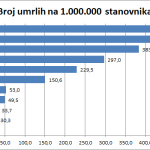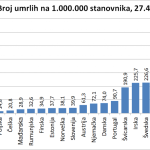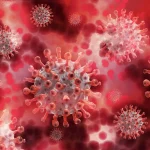April 3, 2020 —Croatia’s Civil Protection Directorate earned kudos for its response to the coronavirus crisis and strict measures seemingly followed by everyone — except, apparently, Dalmatians.
The Civil Protection Directorate wanted to deliver positive news, with 48 new infections showing a steep in the virus’s spread yesterday. Instead, Health Minister Vili Beroš and other officials chastised young folks in Croatia’s coastal region for reportedly flouting social distancing measures and restrictions on movement. Data released by Google later in the day confirmed not just Dalmatians, but Croats in general are flouting the rules.
Locals and officials claim many young adults in Zadar, Split and Šibenik continue to congregate in cafes with tinted windows, drinking and socializing. Footage also emerged of Split locals enjoying a casual game of their traditional take on volleyball.
Various reports from around the country suggest social distancing and self-isolation measure have met their match in Dalmatia’s traditional contrarian spirit and self-assurance.
“This is not acceptable behavior,” a visibly irate Beroš said during a press conference yesterday. “In doing so, they endanger themselves, their families and the health of the nation. I would like to tell everyone to be patient and wait for this epidemic to end. There will be time to socialize and relax. Until then, we must be disciplined and extremely cautious.”
Zadar’s Mayor Branko Dukić, a medical doctor himself, is baffled.
“I understand everyone who has a hard time being indoors, I have not spent as much time in my entire life as I have in recent weeks,” he reportedly said in a statement. “But I cannot understand that we are playing so easily with the health and lives of ourselves and our loved ones. Whichever state and whatever city tried the ‘it won’t happen to me’ tactic ended in disaster.”
As the directorate was holding its press conference, locals in Split publicly defied orders to stay at home by continuing to play “picigin,” a local beach-volleyball variant that favors banana hammocks and shallow water.
One day later, police promised to put the kibosh on all games of “picigin.”
“Had police officers found themselves at the ‘picigin’ game, they would have certainly warned the participants to disperse. You can walk, but ‘picigin’ cannot be played under these circumstances,” Split police reportedly said in a statement.
Workers in Dalmatian hospitals took to chastising their neighbors as well. One sent a plea to Dalmacija Danas, with a video of his hospital ward.
“Do you want me to send footage of a man choking and begging to be intubated?” he wrote. “Or are you waiting for the next one to be one of you ?! Hello?! Are we going to do anything?!”
Stipe Čogelja, Head of the Department for Tourism and Maritime Affairs of the Split-Dalmatia County, said in an interview some locals are exploiting the situation to build illegal piers and other structures on the maritime commons, a protected strip of land where the sea meets soil with strict limits on construction.
The head of the Civil Protection Directorate and Interior Ministry Davor Božinović said he won’t introduce stricter police measures or regular patrols, as some neighboring countries have.
“I did not know about young people gathering in cafes, but it does not surprise me,” he said, adding local police forces will be instructed to monitor local cafes and bars. “Young people are often unaware of this and when they do not see and feel that there is an enemy that we all fight together, they think that it is not there.”
Director of the Infectious Diseases Clinic “Dr. Fran Mihaljevic” Alemka Markotic also denounced the relaxed attitude, pointing to the growing number of patients on ventilators. New figures from the United States and other western countries offer a grim forecast for any critically-ill patient requiring a breathing machine, with a majority dying anyway.
Markotić said it’s best to limit any situation that might spread the virus.
“I am sure that Split may be the first in everything, but that it does not want to be the first in the corona,” she said. “Please show the citizens in the south that you are better than others and do not allow the corona to expand.”
The chastising runs against the overall compliance shown by Croats around the country — something reiterated with a trove of data showing Croats have cut back on their movement significantly.
The online giant released a trove of data showing users’ movement during restrictive measures in comparison, showing Croats cut back their outdoors excursions by some 82 percent from Feb. 26 to March 29, compared to Jan. 3 and Feb. 6, before restrictions took force.
Google users cut back their trips to work by 50 percent across the country, while people are overall spending 16 percent more time in residential areas.
But the most telling statistic: visits to parks, which in an era of “stay at home” should be close to zero. Overall, Zagreb County, Varaždin County and Lika saw the biggest drop in visits to the park.
Dalmatians didn’t follow suit. Residents of Šibenik-Knin County curtailed their visits to parks by only 12 percent. Not far behind were Osijek, Karlovac, then Zadar.
Croatian Public Health Institute Director Krunoslav Capak criticized the reports from Split and Zadar, warning the consequences of their nonchalance would come back to haunt them.
“Today, there are half as many new cases as yesterday, which is an extremely favorable situation and we want this trend to continue,” he said at the press conference.










